In 1886, German architect Mies van der Rohe made a famous declaration:
less is more
— Mies van der Rohe
In 2019, not to be outdone, American Youtuber MattySmokes420 countered with the following propisition
LIKE AND SUBSCRIBE FOR MORE GREAT CONTENT!
— MattySmokes420
Both men make compelling arguments. I'm beginning to think that less is becoming a more important option in our modern era, the Age of Great Content™.
Mies van der Rohe was a pioneer of modernist architecture, which was a cultural precursor to the minimalist art movement of the 20th century. In the years since, minimalism has evolved into a variety of other art forms and areas of life. Nowadays we watch as Marie Kondo, a petite and joyful Japanese woman, preaches to her Netflix audience to remove all possessions that don't "spark joy" in one's life. Clean up your room and throw things out; this is minimalism in 2020.
Minimalist Roots
Looking back at its origins as an artistic philosophy in the 1950s, minimalism was an attempt to "expose the essence, essentials or identity of a subject through eliminating all non-essential forms, features or concepts", according to an art critic named Wikipedia.
In the context of American art, minimalism was a response to the abstract expressionism movement of the mid-twentieth century. Abstract expressionism was popularized by artists like Pollock, Rothko, and de Kooning who eschewed form and objectivity in favour of the surreal. It was dynamic, spontaneous art that often overflowed with emotion and energy. These artists chose to abandon traditional composition and evoke a subconscious representation of a subject instead.
Jay Meuser, an American abstract expressionist, wrote about the power of expressionism:
it is far better to capture the glorious spirit of the sea than to paint all of its tiny ripples
— Jay Meuser
The artists of the abstract expressionist movement sought to express their personal emotions through their paintings. As such, each work of art is integrally tied to its creator. Art created to serve this purpose can be viewed as narcissistic or pretentious, but as much as these artists have imbued themselves into their work, the observer still has their own subjective reaction to the art.
A painting is not a picture of an experience. It is the experience.
— Mark Rothko
Rothko sought to cultivate a personal experience for the observer, but it's still hard to separate him from his work when each brush stroke was produced by his hands. When you see Rothko's bright, colourful rectangles slowly transform over the years into darker and darker shades, ultimately culminating in a work with no colour at all, it's hard not to think of his suicide just a year after this was painted.
It's this context and the intimate focus on the artist that minimalist art strives to eliminate. How can an artist remove themselves from the experience of the art? How can an artist create something with no meaning at all?
Minimalism is all about literal, physical presence. It's characterized by extreme simplicity and a reduction of any personal and referential elements so that only the objective, purely visual aspects remain. The minimalist artist seeks to remove all external references so that the viewer is affected only by what's in front of them. The material, form, and location is the entirety of the art. Because of these principles, most minimalist art is in the form of sculptures, not paintings. It's also common for it to be manufactured in bulk or produced by automated machinery, further removing the artist from their creation.
If the purpose of abstract expressionism is to represent boundless emotion, perhaps minimalism is about the boundaries themselves. That, I believe, is the crux of minimalism: erecting boundaries and then thinking about your relationship with them.
Now, I can certainly appreciate this style of art and the virtues it represents. A metal cube placed on the floor in front of you can be seen as a very pure form of beauty; the art does not try to imitate something it's not and in that sense it's truthful. It's easier to understand minimalist art by comparing it to abstract expressionism because its existence is an antithesis to all the emotionally driven art that preceded it. If the point of art is to evoke feelings and start discussions then I think minimalist art, as boring as it may seem, fits this criteria still.
Minimalism's popularity grew throughout the 1960s and 1970s and its core tenets have spread to other disciplines and areas such as music, architecture, software, and lifestyle. I'd resist saying that minimalist art was the direct inspiration behind this widespread adoption; I believe it's more to do with why minimalist art resonates with us in the first place.
When we see a neat tiling of bricks on a wooden floor, or a tidy, all-white spacious room with white chairs and white shelves, or a clean and simple user interface on a smartphone app...we're drawn to the simplicity and clear distinctions. I think it's deeply rooted in the fact that these straight lines and neat symmetries aren't found in nature. They're created by humans and the visual logic is comforting to us.
 stupid monkeys looking at a monolith
stupid monkeys looking at a monolith
 cultured humans appreciating art
cultured humans appreciating art
Like the apes being captivated and inspired by the monolith in Kubrick's 2001: A Space Odyssey, minimalist design can open up possibilities to us and teach us about the essence of things. Maybe a minimalist lifestyle can have similar benefits.
Digital Minimalism
In Digital Minimalism, Cal Newport describes a healthier approach to technology inspired by minimalist ideologies. The book provides guidelines for improving our personal use of technology, specifically the use of internet-based entertainment, social media, and video games. In a broader sense, Newport wanted to address the consequences of ubiquitous connection and endless content that is now possible thanks to smartphones and the internet.

It was interesting to read this book during the Coronavirus outbreak, as Canada and the rest of the world has been living in lockdown. Almost everyone is in social isolation within their homes; our only face-to-face contact is with the people we live with, which might be nobody. Newport spends time exploring the fundamental differences between connection, which is digital interaction and communication with others, and conversation, which is real, physical interaction. Anyone that's been in lockdown over the past couple months has become intimately aware of these differences. We've all felt the negative effects of connection without conversation.
Coronavirus has forced us into the largest global social experiment in the history of our species. It'll be interesting to see the short and long-term results of this experiment.
A Fundamental Disconnect
Connection is any form of digital interaction with others. The most basic examples of which are Facebook's "Like" or Instagram's "Heart", which are literally a single bit of transmitted information and therefore the smallest amount of interaction possible between two people. Text messaging, whether through SMS, comments, or e-mail would be the next "level" of interaction we use frequently, which is fairly low-bandwidth as well.
It's hard to convey emotion with just words, especially when you don't message the other person frequently (although anyone in a relationship can sense danger when their partner sends them a single "k").
Newport argues that connection is an insufficient and vapid substitute for true conversation. He points to several studies conducted on the effects of heavy social media use that generally correlate this behaviour with loneliness, less satisfaction in one's life, and increased anxiety.
If social media causes such a detriment to one's mental health, why is it so popular in the first place? Newport's explanation can be reduced to two primary reasons. The first explains why we're so willing to replace real conversation with digital connection...we're lazy:
Humans are naturally biased toward activities that require less energy in the short term, even if it's more harmful in the long term—so we end up texting our sibling instead of calling them on the phone, or liking a picture of a friend's new baby instead of stopping by to visit.
— Newport, pg. 185
This shift towards "easier" forms of communication is blatantly evident today. The decline of phone calls in favour of texting (in my generation at least) is a primary example. Social media provides ways of interacting with your friends and family from the comfort of your own home, on the bus, or anywhere really. It's so convenient and accessible that we feel, at times, more connected to the people in our lives, but Newport believes that by replacing physical time spent together with these digital forms of communication, we lose out on the real benefits of social interaction.
The second reason we love social media is that it's explicitly designed to be addicting to our tribal monkey brains. The more time we spend using Facebook's services, the more ad money they receive. There's already a plethora of research and information available that explains exactly how these tech companies build addicting feedback loops into their products, so I won't go into detail. If you're interested, a google search will yield plenty of results, or this podcast episode with the author Cal Newport is a great explanation too.
Unfortunately, the negative effects of ubiquitous technology don't stop at our social lives, according to Newport. This constant connectivity and consumption has a major effect on our psychological welfare. Always having stimulus from outside sources means we're never truly alone with ourselves anymore. These moments of solitude are vital:
For one thing, when you avoid solitude, you miss out on the positive things it brings you: the ability to clarify hard problems, to regulate your emotions, to build moral courage, and to strengthen relationships
— Newport, pg. 136
I really believe in the importance of alone time, especially with how it helps to clarify what's important to you. When you give your mind the space to breathe, when you're not processing anything and there's no distracting stimuli, the things that are important to you will naturally surface to your consciousness. If you start thinking about something for no reason, there's probably a good reason you should be thinking about it. Moments like these, and the decisions I make during them, I tend to value greatly.
Same Fight, New Weapons
Newport is careful to note that the ability to keep us distracted is not a new problem that Silicon Valley has created. There's always been ways of keeping ourselves lazily entertained, and ever since advertising became a part of entertainment, the "attention economy" has been figuring out ways of getting more and more of your eyeball time. What has changed is how pervasive this influence has become and how it's infiltrated every corner of our daily lives:
Erecting barriers against the existential is not new—before YouTube we had (and still have) mindless television and heavy drinking to help avoid deeper questions—but the advanced technologies of the twenty-first-century attention economy are particularly effective at this task.
— Newport, pg. 217
The presence of smartphones and devices that we can carry on our person at all times has given us the previously unimaginable ability to access...well...literally everything. If you can't comprehend how insane that is then I suspect you were born after 2000 and it's just expected for you (shouldn't you be making a TikTok right now or something?).
Smartphones are, without a doubt, incredibly powerful tools we've been given. It's vital that we learn to properly manage this power without losing ourselves. It may sound hyperbolic, but I believe it's necessary. Just as art minimalism was a response to the sensory overload of expressionist art, so too must we respond to a world that claims it's given us all we ever wanted, right in our pocket.
A Path Forward
So, how exactly does Newport suggest we survive in this brave new world? It's quite simple: Newport wants everyone to become Amish because they figured this stuff out a long time ago. Just kidding, but Newport does spend time lauding the Amish for their altogether reasonable approach to technology.
Most people assume that the Amish are strictly opposed to all modern technology, but they actually adopt new tools and technology sometimes—whenever they collectively agree that the tool is beneficial:
The Amish, it turns out, do something that's both shockingly radical and simple in our age of impulsive and complicated consumerism: they start with the things they value most, then work backward to ask whether a given new technology performs more harm than good with respect to these values.
— Newport, pg. 77
This sort of value-driven adoption is closely aligned with what Newport actually suggests we do to curb our use of technology. It's what he calls digital minimalism:
A philosophy of technology use in which you focus your online time on a small number of carefully selected and optimized activities that strongly support things you value, and then happily miss out on everything else.
— Newport, pg. 48
In other words, use technology only when it benefits what you personally value. Use it as a tool for life, not a substitute for it. It's certainly easier said than done—there's so many reasons we use technology and so many ways it's become integrated into our lives already. It's helpful to at least become aware of these things though. The Googles and Facebooks of the world have every intention of taking over all aspects of your life; I've wrote previously about how their entire business model is predicated on mining your data and keeping your attention. In an economy like this, we must erect boundaries and protect ourselves. This is what digital minimalism is: a way of saying no.
 streaming yourself on Twitch watching Youtube videos while scrolling through Instagram
streaming yourself on Twitch watching Youtube videos while scrolling through Instagram
 throwing your phone into a lake
throwing your phone into a lake
Newport goes into a lot of detail on how to become a digital minimalist and what he recommends you do with all the free time you're going to suddenly have. Overall, I thought it was a very thought provoking read despite being overly prescriptive at times. There was a sense of "look at all the great ways I spend my time" kind of vibe in certain sections, which came off as a little pretentious.
In general though, what Newport has written about in Digital Minimalism is essential. Minimalism has existed for a long time in different forms; it's become an important concept for helping us figure out how to live simply. I'll end with Newport's succinct strategy for assessing the technology in our lives, when deciding whether it's necessary or not:
Does the technology:
- Serve something you deeply value (offering some benefit is not enough).
- Be the best way to use technology to serve this value (if it's not, replace it with something better).
- Have a role in your life that is constrained with a standard operating procedure that specifies when and how you use it.
Technology should serve our values, not define them.
